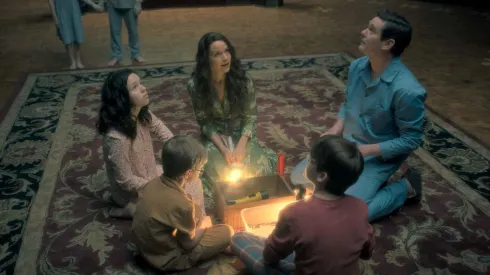The shadows of the past are never truly laid to rest, but instead, take on new forms, murmuring from the dark corners of the soul. Mike Flanagan’s The Haunting of Hill House mastered this dark equation, trading cheap jump scares for a chilling, slow-burn exploration of generational trauma, grief and addiction, manifesting personal pain as palpable, flesh-and-blood monsters.
The series was a profoundly moving family drama first and a terrifying ghost story second, forging a new gold standard for psychological horror that blends genuine emotional depth with breathtaking visual terror.
Audiences have been left searching for similar narratives that wrap the viewer in a suffocating atmosphere of dread, where secrets fester like wounds and the line between supernatural terror and mental decay is painfully blurred.
The Haunting of Bly Manor (2020)
The second installment in Mike Flanagan’s anthology pivots from family trauma to a gothic ghost romance. Loosely based on Henry James’s The Turn of the Screw, the series uses a majestic English country manor as the stage for exploring themes of love, loss, and how memory becomes the most persistent specter.
Midnight Mass (2021)
Also from Mike Flanagan, this series steps away from the haunted house genre to focus on an isolated island community where the arrival of a charismatic young priest brings both miracles and terrors. It is a slow, profound meditation on faith, addiction, guilt, and the true nature of monstrosity, focusing more on existential horror than spectral dread.
The Fall of the House of Usher (2023)
A savage, tragicomic horror satire inspired by the works of Edgar Allan Poe. The series centers on a corrupt pharmaceutical dynasty facing a familial curse that systematically consumes the entire bloodline. It mirrors Hill House’s core concept of a deeply dysfunctional family being devoured by its own past sins and secrets.
Penny Dreadful (2014-2016)
A brilliant piece of Gothic horror set in Victorian London, the series weaves together iconic literary characters like Dracula, Dorian Gray, and Victor Frankenstein. It shares Hill House’s deeply sentimental tone and the use of supernatural entities as powerful metaphors for profound, life-altering personal trauma.
Dark (2017-2020)
If the non-linear timeline and the theme of inescapable family fate in Hill House captivated you, the complex German series Dark takes this to an existential level. It is fundamentally a family saga heightened by time travel and a dark, multi-generational mystery that proves fate is a relentless, closed loop.
Archive 81 (2022)
An archivist is hired to restore mysterious video tapes from 1994, which pulls him into a demonic cult and the story of a woman who may be trapped in an alternate dimension. The series masterfully blends found footage, cosmic dread, and an atmosphere of slow, creeping intrusion, questioning the very nature of reality.
Castle Rock (2018-2019)
This anthology series is set within Stephen King’s literary universe, intertwining characters and storylines from his most famous works. It resembles Hill House in its reliance on supernatural phenomena and non-linear storytelling to explore the deep-seated psychological trauma that permeates a single, cursed location.
Marianne (2019)
For those who seek horror with a sharp edge but the same dedication to personal trauma. A successful horror novelist must return to her hometown when the demonic entity that has haunted her dreams since childhood begins to manifest in the real world. This French series is praised for its genuinely terrifying atmosphere and relentless sense of dread.
Servant (2019-2023)
A meticulously crafted piece of slow-burn psychological horror. A wealthy Philadelphia couple, grieving an unspeakable tragedy, hires a nanny to care for their “baby,” which is actually a lifelike doll. The tension is excruciatingly built within the claustrophobic confines of a house, turning the home into a prison of anxiety and denial.
Channel Zero (2016-2018)
An anthology series that adapts internet creepypastas (urban legends) into short seasons. Channel Zero aligns with Hill House’s method of building intelligent psychological horror through thoughtful storytelling and powerful imagery, rather than relying on cheap scares, delivering imaginative and deeply unsettling narratives.
